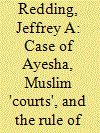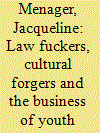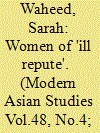|
|
|
Sort Order |
|
|
|
Items / Page
|
|
|
|
|
|
|
| Srl | Item |
| 1 |
ID:
132964


|
|
|
|
|
| Publication |
2014.
|
| Summary/Abstract |
This paper aims to challenge the disparagement of non-state Islamic systems of law that has established firm roots in contemporary rule of law ideology and practice around the world, from India to Ontario. In this respect, rule of law ideology has tended to ignore actual mechanics and procedures of law, not only in legal venues outside the state's direct control, but also in the state's courts themselves. With respect to non-state legal venues-and especially non-state Islamic legal venues-such ideology understands and describes the practices and procedures that it finds in these non-state venues as crude and underdeveloped at best, and illiberal and in violation of the rule of law at worst. While other scholarly work has vividly demonstrated the various transformations and mutations that any state's 'ideal legal procedure' experiences as it is put into real-world practice by a state's courts and judges, this paper makes a converse move. Using a case-study focused on the circumstances and experiences of an Indian Muslim woman, 'Ayesha', who recently used a Delhi dar ul qaza to exercise her Islamic divorce rights in India, this paper demonstrates how a non-state Islamic legal venue behaves in ways which are highly evocative of rule of law ideology's idealization of state courts and how they (should) operate procedurally. In doing so, this paper provides evidence for Partha Chatterjee's thesis as to how elite and subaltern domains-understood here to be embodied in both state and non-state legal venues, respectively-are products of 'mutually conditioned historicities'. In this case, the focus is on the state's conditioning of the non-state. As a result, rule of law ideology's state-oriented critique of the (Islamic) non-state is mistaken because, as this paper demonstrates, the non-state is produced in conversation with the state; one cannot critique the one (non-state) domain without realizing how that critique implicates the other (state) domain.
|
|
|
|
|
|
|
|
|
|
|
|
|
|
|
|
| 2 |
ID:
133123


|
|
|
|
|
| Publication |
2014.
|
| Summary/Abstract |
Myanmar's rolling political and economic transition is being shaped by profound generational change. Little attention has been paid to the priorities and politics of the new generation of youth. This article seeks to explore the construction of Myanmar's elites as a homogenized, unitary, uncontested group through a close examination of elite youth. The article challenges some basic preconceptions about Myanmar's elites. Three primary youth cohorts are appraised and situated in the transition: the entitled business elite, the cultural forgers and the resistant forces. All three groups are privileged in Myanmar society, where their power struggles see efforts to assert degrees of cultural supremacy. Drawing on ethnographic research in Myanmar, the article offers insights into the role of elite youth in Myanmar's future and their perceptions of the present shift of national political and economic policies.
|
|
|
|
|
|
|
|
|
|
|
|
|
|
|
|
| 3 |
ID:
132965


|
|
|
|
|
| Publication |
2014.
|
| Summary/Abstract |
The courtesan, the embodiment of both threat and allure, was a central figure in the moral discourses of the Muslim 'respectable' classes of colonial North India. Since women are seen as the bearers of culture, tradition, the honour of the family, community, and nation, control over women's sexuality becomes a central feature in the process of forming identity and community. As a public woman, the courtesan became the target of severe moral regulation from the mid-nineteenth century onwards. The way in which the courtesan was invoked within aesthetic, ethical, and legal domains shifted over time, and by the third decade of the twentieth century, there appeared a new way of speaking and writing about the 'fallen woman' within the Urdu public sphere. A social critique emerged which heralded the prostitute-courtesan as an ethical figure struggling against an unjust social order. Since the courtesan symbolized both elite Mughal court culture as well as its decay, she was a convenient foil for some nationalists to challenge the dominant idioms of nationalist and communitarian politics. Moreover, certain late medieval and early modern Indo-Persian ethical concepts were redeployed by twentieth century writers for 'progressive' ends. This illustrated a turn to progressive cultural politics that was simultaneously anti-colonial and anti-communitarian, while maintaining a critical posture towards the dominant idioms of Indian nationalism.
|
|
|
|
|
|
|
|
|
|
|
|
|
|
|
|
|
|
|
|
|